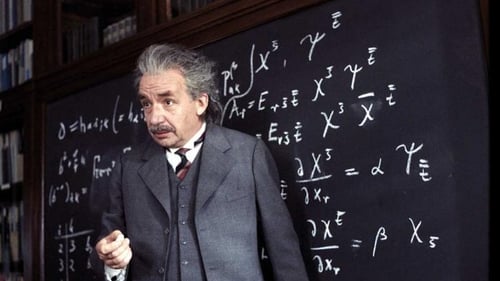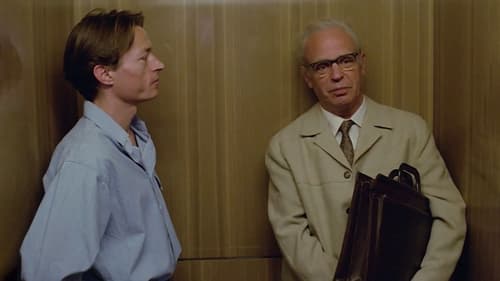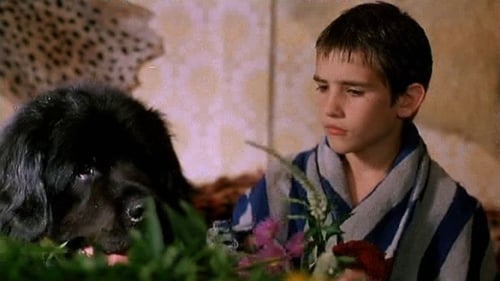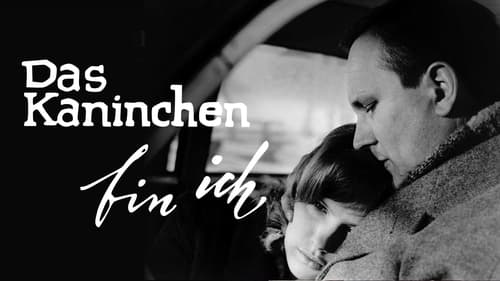Roland Kuchenbuch
出生 : 1943-02-22, Stettin, Pomerania, Germany [now Szczecin, Zachodniopomorskie, Poland]

Glogau sr.

Two part movie about Einstein's escape from Germany in 1932 and his influence in the invention of the nuclear bomb in 1939.

n.A.
The architect Daniel Brenner is in his late thirties when he receives his first challenging and lucrative commission: to design a cultural center for a satellite town in East-Berlin. He accepts the offer under the condition that he gets to choose who he works with. This way, he reunites with former colleagues and friends - most of them architects or students of architecture who have since chosen a different profession due to personal restraint or economic confinement. Together, they develop a concept which they hope will be more appealing to the public than the conventional and dull constructions common to the German Democratic Republic. However, their ambitious plans are once and again foiled by their conservative supervisors. As frustration grows, Daniel has trouble keeping his career in balance with his family-life: his wife Wanda wants to leave for West-Germany.

Vater
Seven-year-old Kati is glad that despite her spastic disability she is allowed to attend a normal school. Her parents made that possible. In her first year there, she is supposed to prove that she can get along at the school and she does her utmost to keep up with her classmates. Her disability, however, is greeted with constant mockery and disrespect. Even her teachers have a hard time treating her equally. When Kati fails math, she has to attend a special school. Katie is devastated but her friends help her to cope with the new situation.

Offizier am Bahnhof
Even the military academy can't stop kind-hearted officer Gottfried Engelhardt from seeing the world through rose-colored glasses. Everything in the young GDR is blooming: Engelhardt's career, the socialist state, the black market, and maybe even a chance at love.

Kai, a young boy, living in 1923 Berlin tries to convince an American businessman that he can market his chewing gum better than anyone else in town.

In a small town, everyone has tried to forget what happened shortly after WWII. That is, until a stranger finds a book that Jadup (Kurt Böwe) gave to the young refugee Boel (Katrin Knappe), who resettled in the town over 30 years ago. Painful memories about Boel and the post-war period begin to surface and shake up the whole town. Boel vanished back then and nobody knew why. Word spread about a rape and some tried to blame a Russian soldier. Jadup, the town's respected and popular mayor, remembers, though, how he mistrusted Boel and did not help her through this difficult time; HE didn't even notice THAT Boel loved him. Jadup's confrontation with the past gives him a new, critical view of his current situation and surroundings.

Herr Kraft
A little boy tries to keep a huge Newfoundland dog in his family's apartment.

1942. The members of the Voß family, mother, two daughters, a daughter-in-law, and a son-in-law, are living in a house at the river. A fellow soldier of son Paul, who fights at the eastern front, delivers his greetings and an embroidered Russian blouse for Emmi, Paul′s wife. Daughter Agnes, whose husband is also fighting in the war, receives a fur vest from the junior partner who is stalking her. Obviously, the vest is also loot from the eastern front. When the family receives news that Emmi′s husband has been killed in action, the war finally enters the house at the river. Emmi commits suicide while Agnes′s husband returns as a cripple from the war front. At home, he has to learn what a price his wife had to pay for the "Russian fur".

Nachbar
Two adolescents, Sauly and Mick, get to know each other while hitchhiking and stick together for the long haul. They both want to reach the ocean, which is some thousand kilometers away. An old car picks them up, but the trip ends shortly thereafter in a sleazy motel. At the bar, a man named Landolfi approaches them. He explains to Sauly that he must have sold his guardian angel to a man by the name of Miller in the city of Prince. Though the boys do not believe in guardian angels, Sauly slowly succumbs to his own fears. He would like to have his guardian angel back again. On their trip, Sauly becomes sick. Mick works on a farm to pay the doctor's bills. Once Sauly is well, they travel farther - until they reach Prince. In this mysterious city, all of the people are named Miller, and once Sauly and Mick finally are at the ocean, they meet Landolfi once more.

Doctor
On the way to the holiday camp, 16-year-old Steffi falls in love with Norbert, whom she has known for a long time from visiting grandfather in Pinnow. She made a quick decision to change her future plans and decided to become a milker, because Norbert is the newly appointed apprentice trainer for livestock farming in Pinnow. The grandfather, who is very happy about Steffi's visit, cannot prevent his granddaughter from making up her mind.
Norbert himself was an apprentice in Pinnow and often suffered from the teaching methods of his predecessor. That's why he wants to do it differently.

1945. Peace still bears the traces of war everywhere. There meet the animated girl Xenia and the former boxer Henry. Being together gives them a sense of opportunity. She wants to break away from the semi-world milieu, he try a comeback in the boxing ring.

19-year old Benjamin, called Ben, works as a cashier on the fairground und is impressing girls with his youthful self-confidence. After an argument with his uncle, who had caught the boy with a 16-year old girl, Ben leaves his familiar surroundings und ventures into the world beyond the fairground. At Berlin′s Ostbahnhof, he meets the much older cookmaid Hanna, who puts homeless Benjamin up in her flat. Ben finds work as a welder in a factory where he at first has to cope with the prejudice of his sceptical co-workers.

1982: East German actor Erwin Gregorek travels to Hamburg to shoot screen tests for a film about the sinking of the ocean-liner Cap Arcona in 1945 - a catastrophe he himself survived as a concentration camp prisoner.

Otto Scheidel (Manfred Krug) has been captain of the Elbe steamer Jenissei for over twenty years, but his ship, the last of its kind, is going to be converted into a floating restaurant. Otto, whose his strong attachment to the ship has already cost him his relationship with his girlfriend Caramba (Renate Krößner), refuses to take another job and instead joins a railway construction brigade.

On a forest road in the Brandenburg March, village teacher Potsch accidentally encounters the distinguished Professor Menzel, who got stuck there in his car. In the conversation that ensues, Menzel and Pötsch quickly discover that they both are great admirers of the early 19th-century writer Max von Schwedenow who was born in the area.

The wrenching story of a woman sentenced in 1934 to ten years in prison for antifascist activities. The love between her and her fiancée enables her to survive the tribulations of her time in prison, where she is one of few political prisoners.

Ober
Ralf Paeschke is a film student who has to make a documentary film about a group of women working in a lamp factory. There is brazen Susie, mischievous Kerstin, lonely Anita, single Ella, withdrawn Gertrud and the imposing forewoman. When Kerstin is suspected of stealing, tension among the women mounts. Ralf demands that things be clarified, and his film plays an unexpected role in the matter.

When he reaches age 18, Peter is released from the children's home where he grew up, but this does not mean he is truly ready for adult life.

Two men and two women in a hotel.

On the eve of the German Peasants' Revolt, painter Joerg Ratgeb is occupied by a crisis of his own: finding a model for a Christ figure. He sets off on a journey to consult with his artistic role model, Albrecht Dürer. Although Ratgeb has always tried to stay out of the political conflict, his journey brings him face-to-face with peasant revolutionaries and the brutality and violence of their daily lives.

Young lieutenant Riedel, the leader of a motorized unit of NVA riflemen, is always concerned about his men. Thus, he is all the more happy that everything is running smoothly with the new recruits when he returns from his honeymoon. It seems to him that lance corporal Weißenbach, who is not only the oldest of the men but also a formidable armoured personnel carrier driver, has been a reliable stand-in for him. Thus, Riedel is all the more surprised when he learns that Weißenbach boosts the squad's performance with partly questionable methods.

Film by Toman and Gajer.

Tänzer
The Rabbit Is Me was made in 1965 to encourage discussion of the democratization of East German society. In it, a young student has an affair with a judge who once sentenced her brother for political reasons; she eventually confronts him with his opportunism and hypocrisy. It is a sardonic portrayal of the German Democratic Republic's judicial system and its social implications. The film was banned by officials as an anti-socialist, pessimistic and revisionist attack on the state. It henceforth lent its name to all the banned films of 1965, which became known as the "Rabbit Films." After its release in 1990, The Rabbit Is Me earned critical praise as one of the most important and courageous works ever made in East Germany. It was screened at The Museum of Modern Art in 2005 as part of the film series Rebels with a Cause: The Cinema of East Germany.



















